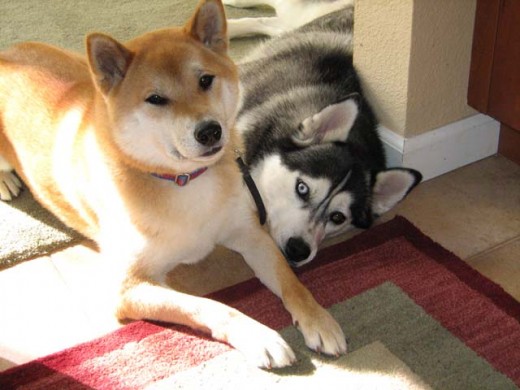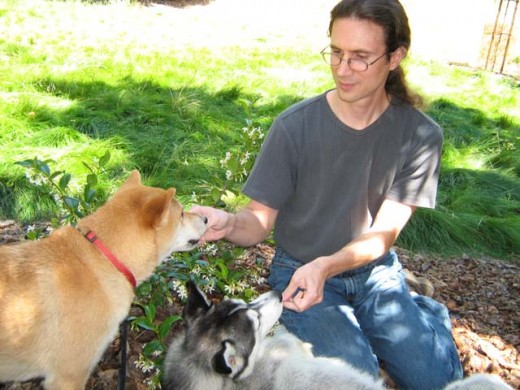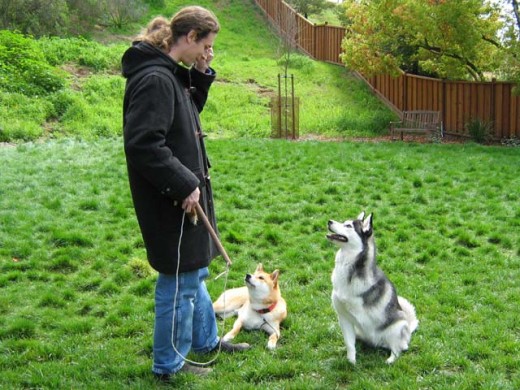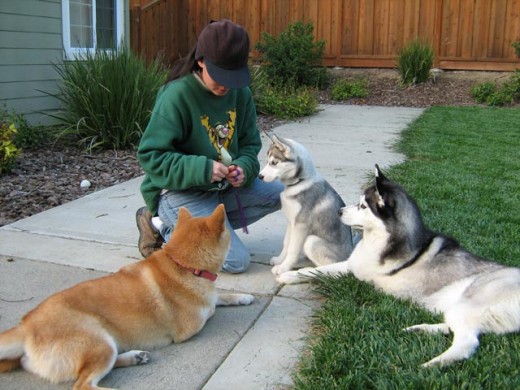Spanking, beating, and hitting a dog, is sometimes used as a form of dog discipline or dog punishment.
After all, biting a dog’s ear worked for Cuba Gooding Jr. in the movie Snow Dogs. Therefore, will such pain based techniques work for us too? To answer this question, we must consider how dogs learn.
Dogs learn through conditioning.
- They repeat behaviors that get them good results, and
- They stop behaviors that get them bad results.
Based on this, there are two schools of thought for stopping problem dog behaviors – reward obedience training and aversive obedience training.

Is It Bad to Beat or Hit a Dog?
Spanking, beating, and hitting a dog are all aversive techniques. Pain is delivered to sensitive areas of the dog, such as his ear or muzzle, when he performs a bad behavior.
The argument for this type of dog discipline, is that the pain will discourage a dog from repeating undesirable actions. Every time our dog does something bad, he gets an unpleasant result (pain), which will hopefully dampen his resolve to perform the same behavior.
However, the problem with aversive training, is that it is risky, too personal, and there is no good way to redirect the punishment.
Our dog knows that the pain originates from us, and is not a natural result of his actions.
As a consequence, our dog may end up learning the wrong lessons, including:
- Hitting, slapping, and biting is a fun game that my owner plays with me. Let me try playing it with him, and with others. A dog may arrive at this conclusion, when the pain is not delivered with enough force. Too much force, however, may result in fear aggression.
- A person’s hand or face coming toward me, is a bad thing. I should run away from people, or bite the hand or face that is a threat to me.
- My owner, or a person coming toward me, means pain. I should stay away from people, or keep them away by growling and biting.
If we do not deliver the pain with good timing, with the proper force, and in exactly the right circumstance, our dog may get confused as to why he is getting punished. He may become fearful and stressed, because he is unsure how he can stop the pain from recurring.
As a result, spanking, beating, and hitting a dog may lead to even more behavioral issues, including fear aggression as well as submissive urination.
For these reasons, using physical techniques to punish a dog, is not very good dog kung fu.

If Not Beating or Hitting a Dog, Then What?!
If beating or hitting a dog does not work, then how can we teach our dogs right from wrong?
How can we get our dogs to behave and not engage in destructive behaviors?
The answer lies in the other school of dog discipline, namely reward based techniques. Some positive based authors that I like include Patricia McConnell, Karen Pryor,
and Suzanne Clothier.
Contrary to what some may say, reward based methods does not just involve “giving food to our dog”. Rather, it allows us to gain pack leadership through the proper control of resources.


We may not realize this, but we already control all of our dog’s resources. For example, we decide when he gets to walk, when he gets to eat, what and how much he gets to eat, when he gets to play, what toys he gets to play with, when he has to go to sleep, what he can chew on, and much more. All we need to do, is teach our dog this fact –
He is NOT in control, WE are.
For example, if my dog jumps on me and bites my hand during feeding time, I tell him that this behavior is unacceptable, by using a no-mark. Then I ignore him, and he does not get his food, until he has calmed down. In this way, he learns that –
- Waiting calmly for his food in a down position = Get food quickly,
- Jumping and biting = Food preparation stops.
If he continues with his bad behavior, I say Time-out, and I remove him to a time-out area. This teaches him that if he cannot behave around people, then he does not get to be with people.
We respond to all other bad behaviors in a similar way – by restricting our dog’s access to his most desired resources, and only giving him rewards when he has earned them through good behavior.
Different dog behavioral issues will involve different tactics, but the overall strategy is one of resource control and proper management.

But Dogs Hit, Bite, and Physically Correct Each Other …
A common argument used to justify physical corrections, is that our dogs do that to each other, therefore, it must be natural and right.
It is true that dogs will sometimes hit and bite each other as a warning, or to correct behavior. Dogs also hit and bite during play. They are able to do this, because they have very good control of the placement and force of their bites.
However, dogs are not humans and *we* are not dogs. We do not have the same physical strengths or control as our dog. We do not have sharp teeth or claws, we cannot run very fast, and our jaws are not very strong.
This is why it is a very bad idea to physically challenge stray or loose dogs. Logic dictates that we do not wrestle, hit, or physically engage with unknown dogs, that may be aggressive. Similarly, we should not slap, beat, or hit our own dog either. Rather than do a bad job at pretending to be a dog, we should play to our human strengths.
As a human,
- We can open and close doors.
- We can drive to the store and buy food, toys, and other good stuff.
- We can open sealed bags, cans, bottles, and more.
- We can reason, build, and develop long-term plans.
In essence, our human abilities give us control of *all* the things that our dog needs or desires. This makes us into natural leaders, because by controlling the pack’s resources, we control the pack.

Finally, when a dog physically corrects another dog, the other dog may decide to fight back.
A puppy may allow an adult dog to correct him initially, but when he grows up, he may learn to respond in-kind with aggression. For this reason and more, I do not allow my dogs to physically correct or bully each other. As pack leader, I set the rules, and I enforce them through the control of resources. If there are any conflicts, my dogs will alert me. I will then do my best to resolve the conflict in a fair and consistent way, which does not involve any hitting, biting, or puncture wounds.
Just because a dog may sometimes hit and bite other dogs, does not mean that hitting and biting is good, effective, or even particularly humane. The assumption or assertion that physical punishment is better because our dogs do it, is a logical fallacy. In fact, there are many things that dogs do to each other and to other animals, that we need to manage, redirect, and retrain. This includes –
- A dog’s drive to hunt neighborhood cats,
- A dog’s instinct to guard resources (with aggression if necessary),
- A dog’s inclination to bully a weaker dog,
- A dog’s impulse to fight-back, and more.

Does Beating or Hitting a Dog Work?
Pain based techniques may stop problem behaviors in the short term, but it is not the most effective type of dog discipline.
There are many difficulties and risks that may cause our dog’s behavior to degrade, rather than improve. Using it to stop one problem behavior, may inadvertently cause five other bad dog behaviors to crop up. In addition, the effect of beating or hitting a dog may degrade over time, as our dog gets habituated to the pain.
In contrast, reward based methods are safer because there is little danger of our dog becoming fearful, aggressive, or stressed. We are not delivering any pain to him, but simply withholding the rewards that he has failed to earn.
- Reward based discipline encourages our dog to figure out how he can get in our good books, because that is the quickest way to get what he wants most.
- Aversive dog discipline, on the other hand, encourages a dog to avoid us because there may be pain involved.
Ultimately, resource based training allows us to forge a stronger bond with our dog, and makes him into a responsible canine, who works for what he wants.
The greatness of a nation and its moral progress can be judged by the way its animals are treated.
~~ [Mahatma Gandhi]


I am in total shock reading the results of this poll! Seriously, half of the readers actually approve of beating, hitting or slapping a dog? I’m sad just thinking about the people who said yes, and so sorry for the dogs they may have. Are people that lazy or just aggressive to believe this is how to treat an animal? Not just an animal, bit your pet, your responsibility, why even have a dog if that’s how it will be treated. People, all the experts agree, beat or physically hurt your dog and you’ll end up with not just a miserable pet, it possibly a dog who will bite you and anyone else out of fear. Use your head. Listen to the experts!
It totally depends on the dog IMHO. My boxer, if he’s not listening and really out of tune I’ll grip his top neck skin (scruff) hard and hold him down. He’ll yelp but it doesn’t hurt him – it’s a dominance thing and he’ll apologise and stay close as we continue walking and keep looking up at me – but he never flinches from my touch and normally a strong and loud word has the same effect.
Working dogs are different, my family breed gun dogs (labs) and on a rare occasion the male of the group has had a sting backhand or slap with the leash and he respects it – but rarely and only when he has challenged his owner strongly. This would damage/break some dogs so definitely not for all, but needed for some.
Totally depends on the animal but I do believe there is
Occasionally a place for physical discipline for some. Best totally aboided for others.
I think you have a good perspective on this. I’ve had dogs and I’ve never hit them and they had good lives and didn’t hurt anyone. If you have to hit someone to make them listen to you, they’re not really listening to you (probably just plotting their revenge haha)
If you get too mad to look after a child or a dog, just leave the room momentarily and calm down using your big amazing adult human brain. Hitting is wrong, lazy and ineffective. We’re better than that.
This was really good thank you
In Jerusalem, I saw dog owners with very obedient dogs. They owners were very loving and sweet to them, but when the dog did something wrong, the owner would tense up and point his finger at them and the dogs would lower themselves on the ground and look guilty and would not move, and would not make eye contact with the owner for long. When they were out of line he would punish them physically, and appeared to get creative in his physical techniques. But for the 3 months I was there, he physically punished them twice. They dogs were not even a year old, but they were very good to him. In fact, all he had to do was yell “No” in Arabic “LAA” and they would like black magic or something, just stop. He would yell their names, and they would come running to him always. I saw he would sometimes hide treats or hot dogs behind his back when he calls them, then when they come he would surprise them and give it to them saying “good job”, so coming to him would always be a potential pleasant surprise for them. I tell you what, the dogs he had were top of the top. His treatment of them was like bootcamp, where he showed them who was in charge/break them down, then build them back up to his liking. And I am amazed how well a dog will become in line with his owner. Its like they were created for their owners. They are such beautiful animals, and they make him laugh, and he and his wife and kids enjoy them. I am not encouraging physical punishments on dogs, just showing that this guy had like 95 percent love and affection, and 5 percent horror movie stuff.
My dogs were fighting each other at the throat today. I freaked out and hit both of them with my hand. Now my new dog is scared to come near me. I feel so bad for hitting him and said sorry. What should I do if they start fighting like that again?
With my dogs, I have found that prevention is always better than cure. When I adopted a new dog recently, she got into a little scuffle with my much older dog over food. After that, I made sure to always keep them either very well supervised or separated. Then I scheduled many safe training and feeding sessions with them together so that they associate being together with getting more food and positive experiences.
The more fights happen, the more likely they are to happen in the future. The more positive experiences my dogs have with each other, the more comfortable they become, and the less they view each other as threats.
As for physically stopping a real dog fight, there are many online articles that describe how to do this “more” safely. However, there will always be a risk of bites when doing this, which is why supervision and prevention are best.
My teething puppy is 8 weeks old, and keeps biting my arm. I’ve got little teeth marks all over. I tell him NO in a firm voice but doesn’t fade him!!! Ugh
I did dog inhibition training with my pups. It was challenging in the beginning but paid off dividends in the longer term.
https://shibashake.com/dog/bite-inhibition/
https://shibashake.com/dog/puppy-biting-how-to-stop-puppy-biting/
I have a yellow lab mix about 40lbs. I am at my son and daughters house to live. They have two bigger dogs. My dog is ver anxious and is on meds to calm him. The other dogs are females. We tried intro in a neutral place. As soon as my dog saw the other dog he growled and lunged. My dog really likes my son.
I am thinking that since my dog has been with me constantly, it might be a good idea if I hold my sons dog and he holds mine to intro them again. I think my dog is possessive of me as well as being anxious. What is your opinion?
We have two 6 week old Shepsky puppies. I’ve noticed that they seem to like my wife more for whatever reason. We both feed them, play with them and cuddle with them. When they yelp and I pick them up they don’t want to stay with me. When my wife does it, they do stay with her. It hurt my feelings so badly that I kind of shut off all my empathy and today when they where yelping incessantly I ticked off and hit them with the palm of my hand. I’m regretting it now, of course. My question is, have I done permenant demage to the dogs’ psyche now? Could it be that the dogs picked up on my stress levels before I ticked off thus gravitating towards my wife more?
My family has had several dogs and we have always used a mixture of adverse training and reward training. Rewards with good behavior, “time-outs” for bad behavior and if timeout didn’t work after multiple attempts we used very light hits just hard enough to feel and not near hard enough to make them yelp. With potty training it was treats if they went outside and adverse if they went inside followed by time-out. I am worried my dog is afraid of me though, and I don’t want him to be. I really love him, and I don’t want him to be scared of me. Is this a good idea or is it confusing to our dog? Can I have some advice?